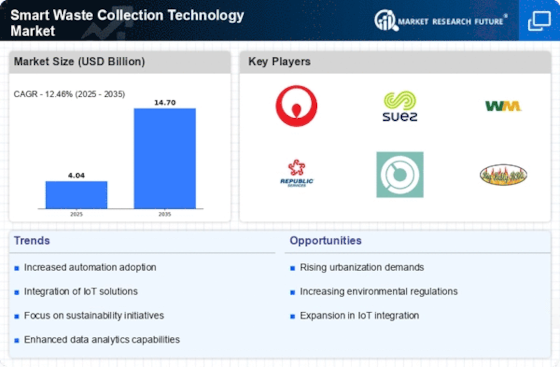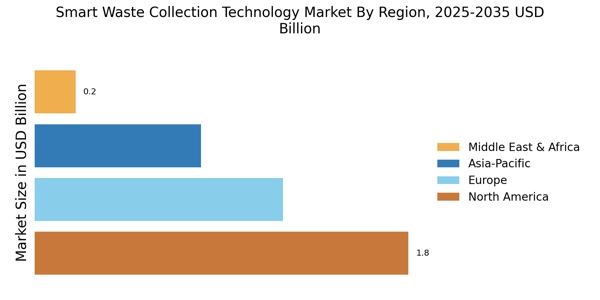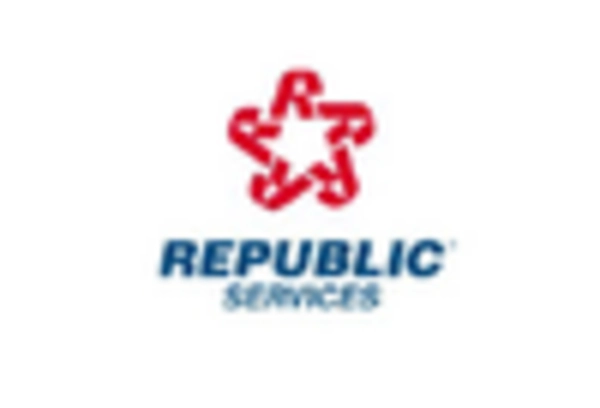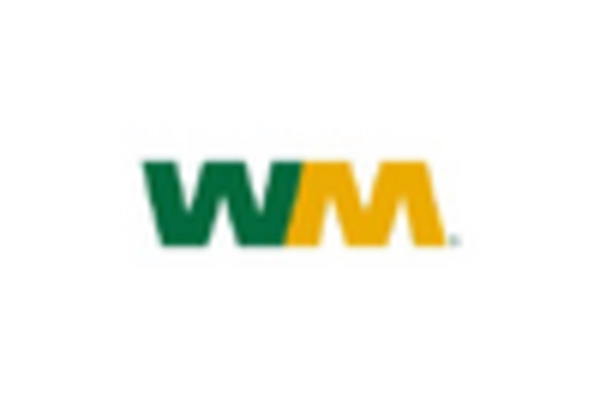Adoption of Smart Bins
The adoption of smart bins is a significant driver in the Smart Waste Collection Technology Market. These bins are equipped with sensors that monitor waste levels and provide real-time data to waste management authorities. This technology allows for more efficient collection schedules, reducing unnecessary trips and associated costs. The market for smart bins is projected to grow substantially, with estimates suggesting a compound annual growth rate of over 15% in the coming years. Additionally, smart bins can enhance user engagement by providing feedback on recycling habits, thus fostering a culture of responsible waste disposal. As cities continue to modernize their waste management systems, the integration of smart bins is likely to become a standard practice.
Focus on Sustainability
The increasing emphasis on sustainability is driving the Smart Waste Collection Technology Market. As environmental concerns escalate, municipalities and organizations are seeking innovative solutions to minimize waste and enhance recycling efforts. Smart waste collection technologies facilitate better segregation of waste, thereby promoting recycling and reducing landfill usage. Reports indicate that cities implementing smart waste solutions can increase recycling rates by as much as 20%. This focus on sustainability aligns with global initiatives aimed at reducing carbon footprints and promoting circular economies. Consequently, the demand for smart waste collection systems is expected to rise, as stakeholders recognize the long-term benefits of sustainable waste management practices.
Urbanization and Population Growth
Urbanization and population growth are significant factors influencing the Smart Waste Collection Technology Market. As urban areas expand and populations increase, the volume of waste generated rises correspondingly. This surge in waste production necessitates more efficient waste management solutions to maintain cleanliness and public health. Smart waste collection technologies offer a viable solution by optimizing collection processes and reducing operational inefficiencies. Projections indicate that urban populations will continue to grow, leading to an increased demand for smart waste management systems. Consequently, municipalities are likely to invest in these technologies to address the challenges posed by urbanization, ensuring that waste management systems can keep pace with growing populations.
Integration of IoT and Data Analytics
The integration of Internet of Things (IoT) and data analytics is a pivotal driver for the Smart Waste Collection Technology Market. IoT devices, such as smart bins equipped with sensors, collect real-time data on waste levels, enabling municipalities to optimize collection routes and schedules. This technology not only enhances operational efficiency but also reduces fuel consumption and operational costs. According to recent estimates, cities utilizing IoT-enabled waste management systems can achieve up to a 30% reduction in collection costs. Furthermore, data analytics allows for predictive modeling, helping cities anticipate waste generation patterns. This proactive approach is likely to lead to improved resource allocation and waste management strategies, thereby fostering a more sustainable urban environment.
Government Initiatives and Regulations
Government initiatives and regulations play a crucial role in propelling the Smart Waste Collection Technology Market. Many governments are implementing stringent waste management policies aimed at reducing landfill waste and promoting recycling. These regulations often mandate the adoption of advanced waste management technologies, including smart waste collection systems. For instance, several countries have set ambitious targets for waste reduction and recycling, which necessitate the use of innovative solutions. As a result, public sector investments in smart waste technologies are expected to increase, creating a favorable environment for market growth. Furthermore, government incentives for adopting sustainable practices may further accelerate the transition towards smart waste management solutions.

















